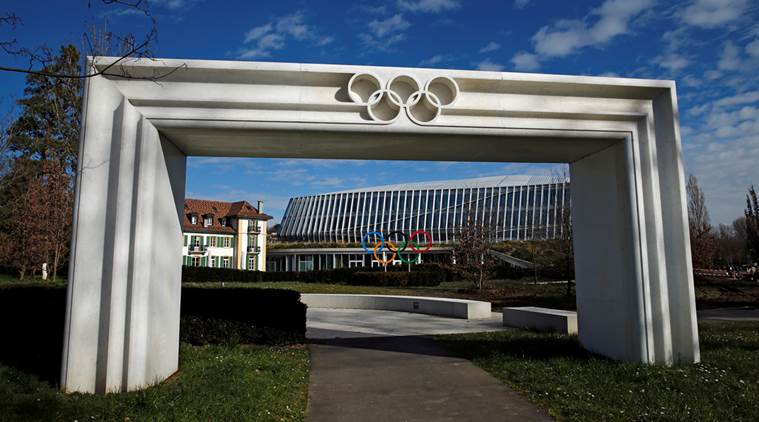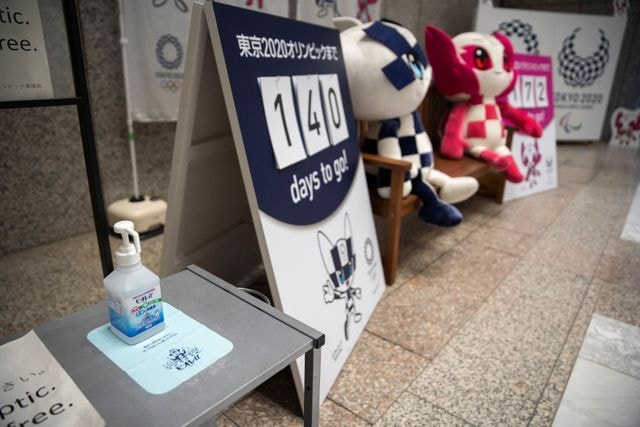 The Olympic rings are pictured in front of the International Olympic Committee (IOC) in Lausanne, Switzerland, March 4, 2020. (Reuters)
The Olympic rings are pictured in front of the International Olympic Committee (IOC) in Lausanne, Switzerland, March 4, 2020. (Reuters)
By Matthew Futterman, Tariq Panja and Andrew Keh
It is the option that nobody in the Olympic movement wants to talk about, but it is the one staring everyone in the face: a Tokyo Games this summer with no fans, just 10,000 athletes competing in front of seas of empty seats.
As the coronavirus continues to spread, with more than 3,000 deaths and 90,000 documented cases worldwide, sporting events without fans are edging toward becoming a kind of new normal. Fans were barred from attending the International Biathlon Union’s World Cup event in the Czech Republic that began Thursday. In Italy, the country’s top soccer league will resume its schedule this weekend by playing matches in empty stadiums with no fans allowed until at least early April.
And in England, where Premier League clubs have been told to avoid pregame handshakes, teams have been advised to begin making plans for the prospect of playing matches without crowds.
But the biggest question on the 2020 sports calendar remains the Olympics in Japan, where competition is scheduled to begin July 22. Last week, the World Health Organization participated in a conference call with dozens of medical officers for the international sports federations that run the competitions at the Olympics.
The discussion turned to worst-case scenarios for the Olympic Games, and the risks and benefits of a fan-free Olympics, according to several people familiar with the nearly two-hour call, all of whom requested anonymity because they were not authorized to speak about a conversation the WHO deemed private. Holding fan-free competitions, with only sports officials and broadcasters as spectators, was one of a number of options suggested for managing large sporting events in the weeks and months before the Games.
According to the people, an expert from the WHO on the call said that the most important thing would be to create a screening process for participants, athletes, fans and others, and to create a risk profile of countries and regions. Participants on the call also discussed the different risk profiles of indoor and outdoor events, as well as those for contact and non-contact sports.
Tarik Jasarevic, a spokesman for the WHO, declined to comment on the discussion because “that call was not public.” But Jasarevic said that the WHO’s role is not to call off — or to permit — any sporting events but is merely “to provide rational and science-based public health guidance and recommendations.”
On Wednesday, Thomas Bach, the president of the International Olympic Committee, said the organization had not mentioned the words “cancellation” or “postponement” during two days of executive board meetings in Lausanne, Switzerland. Bach said the IOC would follow the advice of the Geneva-based WHO.
It remains unclear how any decision about the Olympics would unfold if officials in Tokyo conclude they have to alter plans for the Games. Seiko Hashimoto, Japan’s Olympic minister, said this week that Japan’s position was that as long as Tokyo held the Games in 2020, the IOC could not cancel them.
The 80-page contract the Japan Olympic Committee and the city of Tokyo signed with the IOC in 2013 obligates the local organizers to set up the competitions, ticket sales, fan services and countless other amenities — a deal that would seemingly allow the IOC to push back against any plan to hold the Games without spectators.
But the IOC’s host city contract also gives the organization broad rights to cancel the Olympics in the event of war or other forms of civil unrest, or if it believes, in the contract’s words, that “the safety of participants in the Games would be seriously threatened or jeopardized for any reason whatsoever.”
Neither Bach nor officials in Tokyo have set a timetable deciding whether the Olympics will take place.
 A bottle of hand gel is placed next to Tokyo 2020 Olympic Games mascot Miraitowa and Paralympic mascot Someity in Tokyo. (Reuters)
A bottle of hand gel is placed next to Tokyo 2020 Olympic Games mascot Miraitowa and Paralympic mascot Someity in Tokyo. (Reuters)
A senior official for the 2012 London Olympics said contingency plans had been made for those Games to take place without spectators in the event of an act of God or terrorism. According to those plans, the first group to be prohibited from attending would have been spectators, then nonessential staff members and other groups until only broadcasters and those responsible for running the events were allowed to remain.
Holding the Olympics without spectators, and having to refund ticket sales, could cost Tokyo organizers some $850 million, according to the organizing committee’s budget documents.
A spokesman for the U.S. Olympic and Paralympic Committee said that it had been holding conversations with its athletes, sponsors and other stakeholders about a number of alternative plans for the Games.
Those conversations are being directed by the organization’s new chief medical officer, Dr. Jonathan T. Finnoff, who joined the USOPC in January, just as the coronavirus outbreak was beginning. Finnoff, who had been the medical director for the Mayo Clinic Sports Medicine Center in Minnesota, has worked with the U.S. Ski and Snowboard Association, and he attended the last two Winter Olympic Games.
The American traveling party for the Summer Games can reach as high as 10,000 people, including athletes, coaches, support staff members, friends, family, donors and sponsors.
The most immediate concern, according to US and international sports officials, is the qualifying events for the Games; a number have already been postponed or canceled, wreaking havoc on the process for choosing athletes and teams that will go to the Olympics. In the US, athletes in diving and table tennis could lose qualifying opportunities, and the final qualifying event for the Olympic baseball competition — scheduled for Taiwan in June — could also be in jeopardy.
Without final qualifying competitions, officials may be forced to rely on seasonal leaderboards or world rankings to determine who gets to participate. That could lead to athletes’ missing out on the Games, or filing last-minute grievances with the Court of Arbitration for Sport to fight for their places. As the window before the Games narrows — while CAS still wrestles with the eligibility of Russian athletes caught up in a doping scandal — it is unclear whether the court will have time to rule on the qualifying challenges.